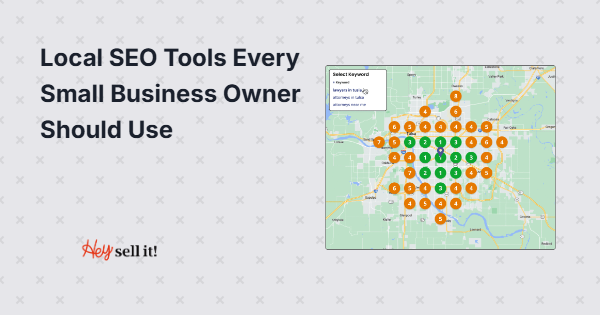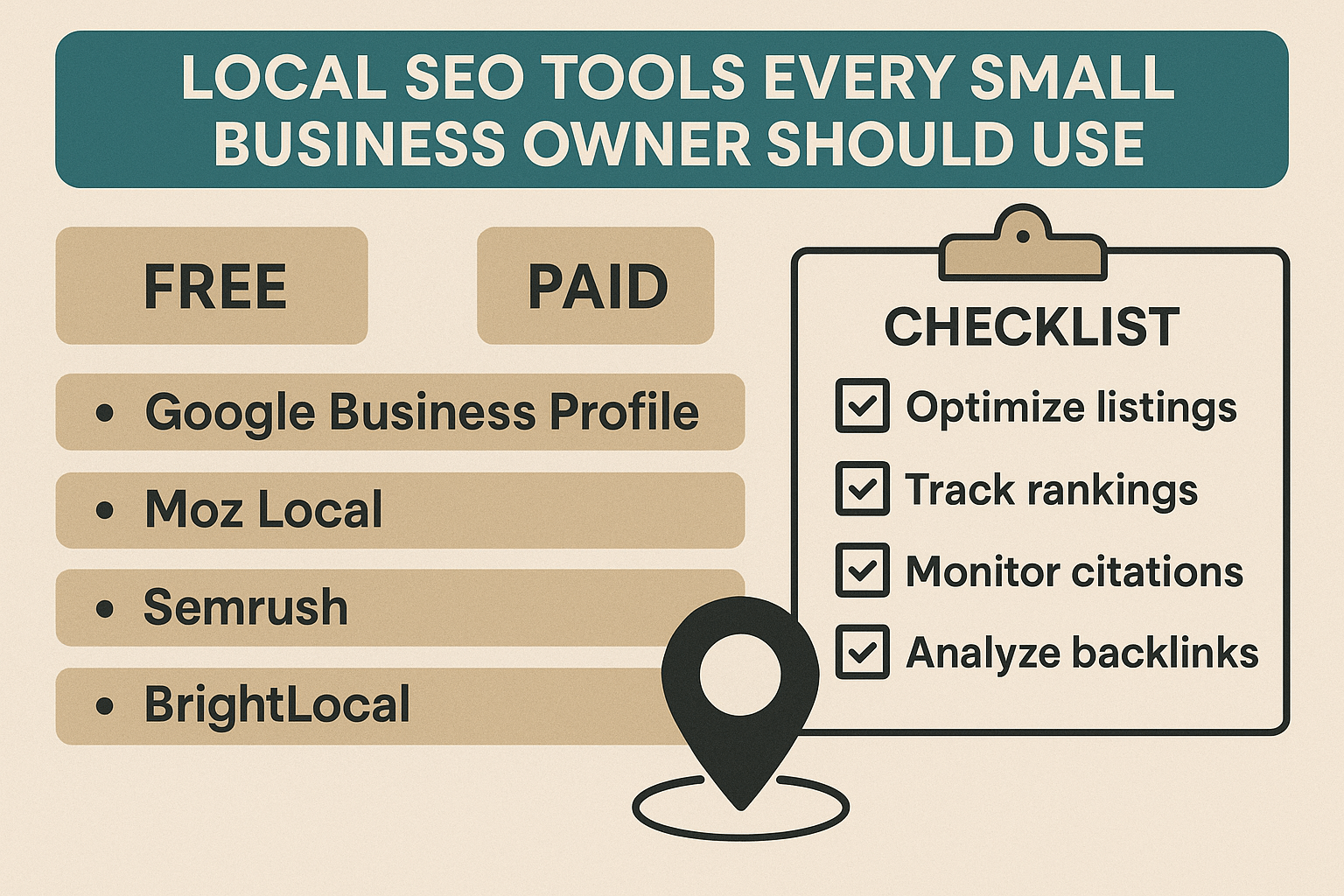Abdullah Usman
The Local Search Revolution That’s Transforming Small Businesses
A potential customer is walking down your street, searching for “best coffee shop near me” on their phone. Will your business show up in those crucial top three local results, or will they walk right past your door to visit your competitor instead?
Here’s a sobering reality check – 46% of all Google searches have local intent, and 76% of people who search for something nearby visit a business within 24 hours. Yet, most small business owners are flying blind when it comes to local SEO, missing out on this goldmine of ready-to-buy customers right in their neighborhood.
After helping hundreds of local businesses dominate their local search results over the past 8 years, I’ve seen firsthand how the right local SEO tools can transform a struggling business into the go-to choice in their area. The difference between businesses that thrive and those that barely survive often comes down to one thing: using the right tools to optimize their local online presence.
Today, I’m sharing the exact local SEO tools that successful small business owners use to attract more customers, increase foot traffic, and grow their revenue – many of which won’t cost you a penny.
Why Local SEO Tools Are Your Business’s Secret Weapon
Before diving into the tools, let’s address the elephant in the room. Many small business owners think local SEO is just about claiming their Google Business Profile and calling it a day. That’s like trying to drive a car with just the steering wheel – you’re missing 90% of what makes the engine run.
Local SEO encompasses everything from managing online reviews and local citations to optimizing your on-page SEO for location-based keywords. It’s a complex ecosystem that requires the right tools to navigate effectively. Without proper tools, you’re essentially trying to compete in a Formula 1 race with a bicycle.
The businesses that consistently rank in the top local search results use specialized tools to monitor their online reputation, track their local rankings, audit their local SEO performance, and stay ahead of their competition. These tools provide the data-driven insights needed to make informed decisions that actually move the needle.
Google Business Profile: Your Local SEO Foundation
Let’s start with the most crucial tool that every local business owner should master – Google Business Profile (formerly Google My Business). This free platform is where 87% of consumers go to evaluate local businesses, making it your digital storefront’s most important real estate.
Your Google Business Profile optimization goes far beyond just filling out basic information. Successful local businesses post regular updates, respond to reviews within 24 hours, and use the insights feature to understand how customers find them. For instance, a local bakery I worked with increased their customer calls by 340% simply by optimizing their profile with high-quality photos, detailed business hours, and regular posts about daily specials.
The key is treating your Google Business Profile like a mini-website. Add detailed descriptions, upload professional photos, create posts about special offers, and actively engage with customer reviews. Businesses with complete profiles are 2.7 times more likely to be considered reputable by consumers.
BrightLocal: The Local SEO Audit Powerhouse
When it comes to comprehensive local SEO auditing, BrightLocal stands out as the tool that reveals exactly where your local SEO strategy is falling short. This platform provides detailed local SEO audits that analyze over 60 factors affecting your local search performance, from citation consistency to on-page optimization.
What makes BrightLocal particularly valuable is its Citation Tracker feature, which monitors your business listings across 100+ directories and alerts you to any inconsistencies in your NAP (Name, Address, Phone) information. Inconsistent citations are one of the biggest ranking factors that small businesses overlook, yet they can single-handedly tank your local search visibility.
The platform’s Local Search Rank Checker allows you to track your rankings for specific keywords in precise locations. A local fitness studio I helped discovered they were ranking #1 for “yoga classes” in their neighborhood but weren’t showing up at all for “fitness classes” – a simple optimization that led to a 45% increase in new member inquiries.
Moz Local: Streamlining Your Citation Management
Managing citations across dozens of directories can feel like herding cats, which is where Moz Local becomes invaluable. This tool automates the process of distributing your business information to major search engines, directories, and social platforms, ensuring consistency across the web.
Moz Local’s Distribution Network includes partnerships with data providers like Factual, Foursquare, and Yelp, meaning your information gets pushed to hundreds of smaller directories automatically. The platform also provides a Citation Audit feature that identifies existing listings and flags any discrepancies that could be hurting your local search performance.
For e-commerce businesses with physical locations, Moz Local integrates seamlessly with your Shopify SEO efforts, ensuring that your local store information aligns with your online presence. This unified approach is crucial for businesses operating both online and offline channels.
SEMrush Local SEO Toolkit: Competitive Intelligence at Its Finest
Understanding what your local competitors are doing right (and wrong) gives you a significant advantage in local search. SEMrush’s Local SEO Toolkit provides deep competitive analysis, showing you exactly which keywords your competitors rank for, their backlink profiles, and their local citation strategies.
The Position Tracking feature allows you to monitor your local rankings against up to 20 competitors across multiple locations. This data becomes incredibly valuable when you’re planning your local SEO strategy and need to identify gaps in your competitor’s approach.
One of my favorite features is the Listing Management tool, which helps you claim and optimize listings across 150+ platforms. The tool also provides specific recommendations for improving each listing, taking the guesswork out of local SEO optimization.
ReviewTrackers: Mastering Your Online Reputation
Online reviews are the new word-of-mouth marketing, with 91% of consumers reading online reviews before making a purchase decision. ReviewTrackers helps you monitor, manage, and leverage your online reputation across all major review platforms.
The platform aggregates reviews from Google, Yelp, Facebook, TripAdvisor, and 100+ other sites, giving you a centralized dashboard to track your reputation. More importantly, it provides sentiment analysis and identifies trending topics in your reviews, helping you understand what customers love and what needs improvement.
The automated review invitation feature helps you proactively request reviews from satisfied customers, while the review response management ensures you never miss responding to customer feedback. A local restaurant client increased their Google reviews by 250% in six months using ReviewTrackers’ systematic approach to review generation.
Whitespark Local Citation Finder: Uncovering Hidden Opportunities
Citations from relevant local directories and industry-specific sites can significantly boost your local search authority. Whitespark’s Local Citation Finder helps you discover citation opportunities that your competitors might be missing.
The tool analyzes your competitors’ citation profiles and identifies directories where they have listings but you don’t. It also provides a Citation Audit feature that scans the web for existing mentions of your business and flags any that need to be claimed or corrected.
For businesses in competitive markets, Whitespark’s Citation Building service can be a game-changer. The platform’s team of experts manually builds high-quality citations, ensuring accuracy and relevance while saving you countless hours of manual work.
Yext: Enterprise-Level Local Presence Management
For businesses with multiple locations or those serious about dominating local search, Yext offers enterprise-level local presence management. The platform manages your business information across 200+ publishers, search engines, and social media platforms.
Yext’s Knowledge Manager ensures that any changes to your business information are instantly propagated across all platforms. This real-time synchronization is crucial for businesses that frequently update their hours, services, or contact information.
The platform’s Analytics feature provides detailed insights into how customers interact with your listings, including click-through rates, direction requests, and phone calls generated from each platform. This data helps you understand which directories provide the most value for your business.
How to Choose the Right Local SEO Tools for Your Business
Not every business needs every tool, and your choice should depend on your specific needs, budget, and growth stage. A single-location service business might thrive with just Google Business Profile optimization and a basic citation management tool, while a multi-location retailer might need enterprise-level solutions.
Start by conducting a local SEO audit to identify your biggest weaknesses. Are you missing citations? Do you have inconsistent NAP information? Are you not tracking local rankings? Once you understand your gaps, you can choose tools that address your specific challenges.
Budget considerations are also crucial. Many of these tools offer free trials or freemium versions that provide substantial value for small businesses. As your business grows and your local SEO needs become more complex, you can upgrade to more comprehensive solutions.
Creating Your Local SEO Tool Stack Action Plan
Building an effective local SEO strategy requires a systematic approach. Start with the foundation – optimize your Google Business Profile completely. This single action alone can improve your local visibility significantly and costs nothing but time.
Next, conduct a citation audit to identify inconsistencies and missing listings. Use tools like BrightLocal or Moz Local to automate this process and ensure accuracy across all platforms. Remember, semantic SEO principles apply to local search too – consistency in how you present your business information across the web builds trust with search engines.
Monitor your online reputation actively using tools like ReviewTrackers or Google Alerts. Respond to reviews promptly and professionally, treating negative feedback as opportunities to demonstrate excellent customer service. Track your local rankings for key terms and adjust your strategy based on performance data.
The Future-Proof Approach to Local SEO Tools
The local SEO landscape continues evolving rapidly, with new features and ranking factors emerging regularly. The tools that serve you well today might need updates or replacements as technology advances and consumer behavior changes.
Stay informed about updates to major platforms like Google Business Profile, which regularly introduces new features and optimization opportunities. Follow local SEO news and case studies to understand how successful businesses are adapting their strategies.
Most importantly, remember that tools are only as effective as the strategy behind them. The best local SEO tools in the world won’t help if you’re not consistently implementing best practices and staying engaged with your local community both online and offline.
Your local SEO success depends on choosing the right combination of tools and using them consistently to build a strong local online presence. Start with the essentials, measure your results, and gradually expand your toolkit as your business grows and your needs evolve.
The businesses that dominate local search results aren’t necessarily the biggest or oldest – they’re the ones that understand their local market and use the right tools to connect with customers who are ready to buy. With these local SEO tools in your arsenal, you’ll have everything you need to become the go-to choice in your local market.


